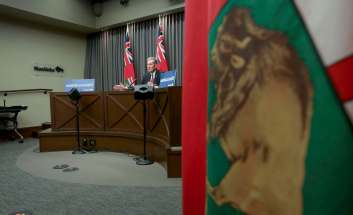Labour, business will have say in $120-M wage top-up for essential workers: premier
Read this article for free:
or
Already have an account? Log in here »
To continue reading, please subscribe:
Monthly Digital Subscription
$1 per week for 24 weeks*
- Enjoy unlimited reading on winnipegfreepress.com
- Read the E-Edition, our digital replica newspaper
- Access News Break, our award-winning app
- Play interactive puzzles
*Billed as $4.00 plus GST every four weeks. After 24 weeks, price increases to the regular rate of $19.00 plus GST every four weeks. Offer available to new and qualified returning subscribers only. Cancel any time.
Monthly Digital Subscription
$4.75/week*
- Enjoy unlimited reading on winnipegfreepress.com
- Read the E-Edition, our digital replica newspaper
- Access News Break, our award-winning app
- Play interactive puzzles
*Billed as $19 plus GST every four weeks. Cancel any time.
To continue reading, please subscribe:
Add Free Press access to your Brandon Sun subscription for only an additional
$1 for the first 4 weeks*
*Your next subscription payment will increase by $1.00 and you will be charged $16.99 plus GST for four weeks. After four weeks, your payment will increase to $23.99 plus GST every four weeks.
Read unlimited articles for free today:
or
Already have an account? Log in here »
Hey there, time traveller!
This article was published 13/05/2020 (1977 days ago), so information in it may no longer be current.
Manitoba’s essential service workers may be getting a one-time payment of up to $1,000.
“These workers have been making professional and personal sacrifices to protect vulnerable Manitobans and to keep us all safe,” Premier Brian Pallister said Wednesday, announcing the province will take part in a $4-billion federal wage top-up program announced last week.
Economic opportunities
Premier Brian Pallister announced the establishment of a new premier’s economic opportunities advisory board to chart the province’s course for reopening and renewing economic growth.
The 18-member panel is chaired by Curt Vossen, president and chief executive officer of Richardson International Ltd.
Premier Brian Pallister announced the establishment of a new premier’s economic opportunities advisory board to chart the province’s course for reopening and renewing economic growth.
The 18-member panel is chaired by Curt Vossen, president and chief executive officer of Richardson International Ltd.
“This board of leaders in sectors including business, technology, financial services and training will draw on its expertise to provide advice to the government on leading Manitoba’s renewed growth following the public-health crisis,” Pallister said Wednesday.
Also included are leaders in transportation, real estate, agriculture, education and manufacturing.
The panel does not include representatives of organized labour.
— Larry Kusch
The big questions: how will Manitoba’s $120-million pandemic bonus money be distributed, and to whom?
Pallister said the government will consult labour and business representatives on how to distribute the wage top-up money to essential workers during the COVID-19 pandemic.
With a list of 74 categories of workers deemed essential, the premier pointed to “the enormity of the challenge.”
“The finance minister and officials will be engaging in both public-sector union leaders and private critical-service providers to hear their input and to make sure we design this program and get the money out (through) an online application system, as we have been doing with our other programs,” Pallister said.
“I think we’re talking about four-figures, maybe $1,000 or so for our front-line workers,” he said, “But don’t hold me to it… The actual amount will be determined after we get advice on the breadth and length of the program from these folks.”
At-risk, front-line workers — such as private security guards at grocery stores and Liquor Marts, and assisted-living support workers making less than $13 an hour — ought to be at the top of the list, says one private-sector union leader.
“They’re getting forgotten about,” United Food and Commercial Workers Local 832 president Jeff Traeger said. “They make really poor wages.”
The union represents 7,500 grocery store workers, 5,000 people in packing plants, 2,400 security guards and 1,000 who work in group homes.
The security guards and support workers receive low wages and are not getting the pandemic bonuses some big grocery store chains provide to workers, Traeger said. “Our hope is they’d be part of the conversation.”
The top-up program is part of a $4-billion federal government subsidy announced last week by Prime Minister Justin Trudeau, targeting essential services workers, with provinces picking up $1 billion of the costs.
When the program was rolled out in mid-April, Finance Canada said it was so provinces could provide a top-up to low-income, essential workers — those who earn less than $2,500 per month.
It’s up to the provinces and territories to develop their own programs and determine the eligibility criteria and funding level, a spokeswoman for Manitoba Finance Minister Scott Fielding said.
“Manitoba has to provide a plan to the federal government to access its funding. That will come after the stakeholder consultation,” Andrea Slobodian said.
The premier claimed Wednesday that Manitoba was the first to confirm it would participate in the federal-provincial plan. However, Saskatchewan and Prince Edward Island had already announced program details.
In Saskatchewan, those making less than $25,000 a year working with seniors, in group homes and child care will see a temporary monthly wage supplement of $400 per month, retroactive to March 15. The program is in effect until July 4.
In P.E.I., those considered essential, who have been working through the pandemic and making less than $3,000 per four-week period, will receive a one-time payment of $1,000 through their employers.
carol.sanders@freepress.mb.ca
larry.kusch@freepress.mb.ca

Carol Sanders
Legislature reporter
Carol Sanders is a reporter at the Free Press legislature bureau. The former general assignment reporter and copy editor joined the paper in 1997. Read more about Carol.
Every piece of reporting Carol produces is reviewed by an editing team before it is posted online or published in print — part of the Free Press‘s tradition, since 1872, of producing reliable independent journalism. Read more about Free Press’s history and mandate, and learn how our newsroom operates.
Our newsroom depends on a growing audience of readers to power our journalism. If you are not a paid reader, please consider becoming a subscriber.
Our newsroom depends on its audience of readers to power our journalism. Thank you for your support.
History
Updated on Thursday, May 14, 2020 10:27 AM CDT: Updates byline





